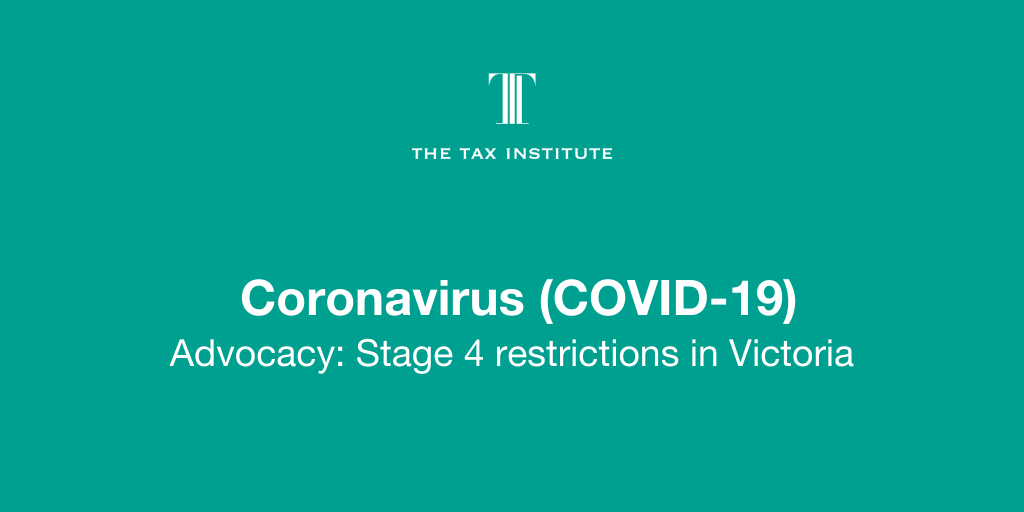
The nation is reeling from the current situation in Victoria. Robyn Jacobson CTA, our Senior Advocate and a Melbourne resident currently in lock down, recently reached out to our Victorian members to assure them that our tax community remains connected and strong
To keep you informed on the advocacy efforts we are making on behalf of practitioners in Victoria and around the country, our recent activities are summarised by Robyn below.
The Premier has declared a State of Disaster for Victoria and imposed Stage 4 restrictions from 6.00pm on Sunday 2 August for metropolitan Melbourne and Stage 3 restrictions from 11:59pm on Wednesday 5 August for Regional Victoria, including Mitchell Shire. The restrictions apply until Sunday 13 September.
This is an incredibly worrying time for all Victorians and our members nationally. Aside from the economic impact of a vast shutdown of the Victorian economy, there are mental health and business and personal financial concerns, along with severe disruptions to family and social activities.
These concerns are not confined to Victorians. They extend to our interstate members who act for Victorian clients, and those whose local clients’ businesses are experiencing disrupted supply chains that originate from Victorian businesses. There is also the added worry of whether the high COVID-19 infection rates in Victoria will be replicated in similar outbreaks elsewhere in Australia.
Specific to the tax profession, our members are expressing concerns including:
- Dismay about the lockdown extending to accounting and law firms;
- How our members are forced to choose between conducting their practices wholly online or closing their practices for six weeks;
- The technological challenges for those practices that are not solely cloud-based;
- The implications for agents in the middle of Tax Time whose clients are anxious to lodge their tax returns and obtain much-needed tax refunds;
- How taxpayers are expected to comply with their tax obligations, including lodgment of tax returns and activity statements and ensuring payments are made in a locked down environment;
- How businesses that rely heavily on their agents can continue to report their monthly turnover figures to ensure continued flow of JobKeeper support;
- The burden of implementing JobKeeper 2.0 as existing JobKeeper recipients consider their continuing eligibility and potential new recipients navigate the eligibility requirements;
- The ability of practitioners to access necessary files, workpapers, documents and correspondence by mail that is physically at the office so they can continue to operate their practices remotely.
Advocacy efforts
In the past few days, The Tax Institute has been actively advocating on behalf of our Victorian members in forums including the National Tax Liaison Group (NTLG) and the ATO’s Tax Practitioner Stewardship Group (TPSG). The detail of these discussions and meetings will be available at a later time but we wanted to share with you some of the advocacy matters that we are currently working on.
Submission to the Treasurer
The Joint Bodies, including The Tax Institute, are preparing a submission to Federal Treasurer, Josh Frydenberg, on the design of JobKeeper 2.0. In particular, we are concerned about the proposed decline in turnover test which, as announced on 21 July 2020, proposes that a business suffer the necessary decline in the June 2020 quarter as well as the September and December quarters.
This will disadvantage many Victorian businesses which may not have suffered a significant decline in the June quarter but due to the lockdown will suffer substantial loss of revenue in August and perhaps later months. The Joint Bodies seek a rethink of the eligibility criteria for JobKeeper 2.0 in light of the worsening situation in Victoria. JobKeeper 2.0 must be flexible enough to adapt to the rapidly changing landscape both now and in the months ahead.
Submission to the Victorian Premier
The Joint Bodies have sent a submission to the Victorian Premier seeking the ability for accountants, tax practitioners and related professionals to temporarily access their business premises to collect and transfer physical documents including mail, files and working papers, and undertake other similar tasks to enable them to assist their clients. The Joint Bodies have also sought clarification from the Premier on the scope of the exemption for ‘sole traders’.
Submission to the ATO
Separately, the Joint Bodies have raised concerns with the ATO about the timing of the Victorian Premier’s announcement, given it fell on the cusp of JobKeeper fortnights 9 and 10. Many Victorian businesses are not currently enrolled in JobKeeper because, to date, they have not suffered the necessary decline in their turnover.
However, the Stage 4 restrictions will cause many businesses to enrol in JobKeeper for the first time. While these businesses have until the end of August to enrol in JobKeeper for any JobKeeper fortnight ending in August, the wage condition for JobKeeper fortnight 9 had to be satisfied by 2 August.
This is not a concern where an employee was paid more than $1,500 for the fortnight. But where an employee was paid less than $1,500, the top-up had to be paid by 2 August. A business that projected its turnover on Sunday 2 August may have found that there was no significant decline but a projection the following day may result in a very different outcome.
The JobKeeper Rules provide the Commissioner with discretion to allow an employer more time to meet the wage condition but this is a matter for the Commissioner. The issue is whether affected employers should be allowed more time (i.e. beyond 2 August 2020) to meet the wage condition for JobKeeper fortnight 9.
Further assistance
The Tax Institute understands how difficult this is for our Victorian members. Many of you may have concerns and questions about what the Stage 3 and 4 restrictions mean for your practice. We are here to support you and will provide further information once it becomes available. You can follow our advocacy efforts in our dedicated COVID-19 economic response hub.
Once again, if in any doubt, please seek advice from the State authorities.








